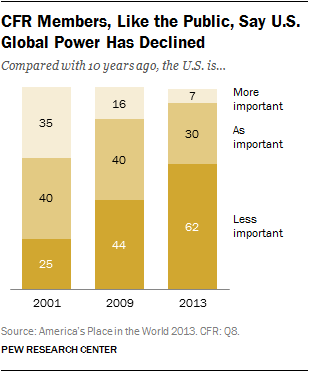
Members of the Council on Foreign Relations, like the general public, believe that the U.S. global power has declined; 62% say the United States plays a less powerful and important role than it did a decade ago. Four years ago, 44% said the United States had become less powerful and in 2001, just before 9/11, just 25% expressed this view.
But the organization’s members – unlike the public – continue to support an activist U.S. foreign policy. An overwhelming majority (86%) favors a shared global leadership role for the U.S., and 55% think the country should be the most assertive of the world’s leading nations.
Who are the members of the Council on Foreign Relations?
The Council on Foreign Relations (CFR) is an independent, nonpartisan membership organization and think tank with more than 4,700 members. They include government officials, scholars, business executives, journalists, lawyers and nonprofit professionals in the field of international affairs.
The survey of 1,838 members of the Council on Foreign Relations, conducted Oct.7-Nov. 11, finds that the organization’s members are much more critical of the Obama administration’s foreign policy than in the previous America’s Place in the World survey, conducted in October and November 2009.
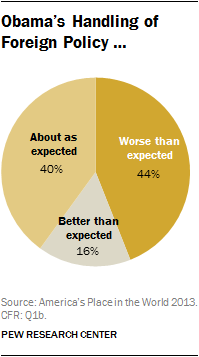
Overall, 44% of CFR members say Obama’s handling foreign policy has been worse than they expected, while just 16% it has surpassed their expectations; 40% say Obama has done about as well as they expected. Roughly half of CFR members (52%) say the Obama administration’s approach to foreign policy is not assertive enough, up from just 31% four years ago.
Nevertheless, Obama gets positive job ratings from CFR members for his handling of several issues, including terrorism (73% approve), Iran (72%), China (69%) and international trade (66%). And a higher percentage of CFR members approve of Obama’s handling of Afghanistan than did so four years ago (56% now, 42% then).
The survey finds that about half of members of the Council on Foreign Relations (52%) express concern that the government’s anti-terrorism efforts have gone too far in eroding civil liberties; far fewer (32%) say their greater concern is that they have not gone far enough in protecting the country.
However, a large majority (68%) says that the NSA’s surveillance program has made the country safer from terrorism, and roughly as many (69%) say that Edward Snowden’s leak of classified information about the program has harmed the public interest.
When it comes to the Middle East, most CFR members (64%) share the public’s preference for stable governments even if there is less democracy in the region. Half of CFR members want the U.S. to be as involved in political changes in the Middle East as it currently is, but of the remainder, about as many want less U.S. involvement as more.
Many Fault Obama’s Handling of Syria
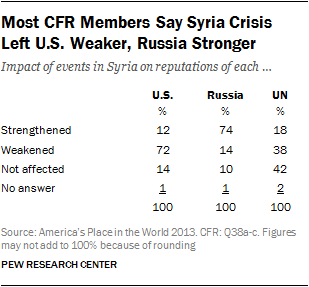
The crisis in Syria was very much on the minds of CFR members as they evaluated the Obama administration’s foreign policy. The survey was conducted shortly after the administration reached a last-minute deal with Russia requiring Syria to destroy its chemical weapons. The president had publicly threatened U.S. military action against Bashar al-Assad’s regime in response to its alleged use of chemical weapons.
About seven in-ten (72%) CFR members say the reputation of the United States has been weakened by the way it has handled the situation in Syria; 12% say the U.S. reputation has been strengthened and 14% say it has not been affected.
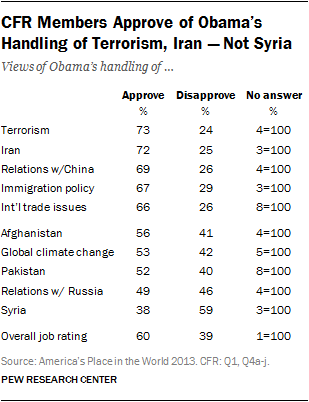
By contrast, 74% of CFR members say Russia’s reputation has been strengthened by the way it handled the situation in Syria, while 14% say it has been weakened and 10% say Russia’s reputation has not been affected. Opinions about the effect on the reputation of the UN are mixed. About as many say the UN’s image has been weakened (38%) as say it has not been affected (42%) by the way it has handled the situation in Syria; 18% say the UN has been strengthened.
Just 38% of CFR members approve of Obama’s handling of Syria while 59% disapprove; these are by far the lowest ratings for the president on 10 foreign policy issues tested. And on Russia, Obama gets mixed ratings (49% approve, 46% disapprove).
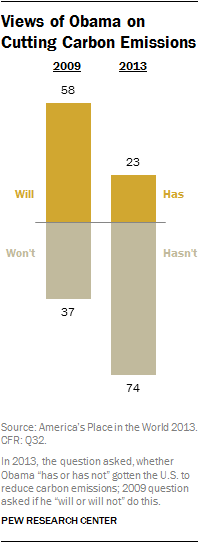
Among Obama’s best ratings are for his handling of terrorism (73% approve) and Iran (72%). About two-thirds also give the president a positive review for his handling of relations with China, immigration policy and international trade.
CFR members’ views of Obama’s handling of trade policy have improved considerably since Obama’s first year in office; 66% currently approve of the president’s handling of trade, compared with 49% in 2009. His job rating on Afghanistan, which was among his lowest in 2009 (42%), has increased to 56%.
However, CFR members express less positive views of Obama’s handling of global climate change, Pakistan and China than they did four years ago. About half (53%) approve of his handling of climate change, down 20 points from 2009. Obama’s approval on Pakistan has fallen 14 points (from 66% to 52%) and 10 points on China (from 79% to 69%).
On climate change, most CFR members (58%) said in 2009 that they expected Obama to get the United States to take significant steps to reduce carbon emissions. But in the current survey, most say he has failed to so. Only about a quarter of CFR members (23%) say Obama has gotten the U.S. take significant action in reducing carbon emissions, while 74% say he has not.
Best and Worst of Obama’s Foreign Policy
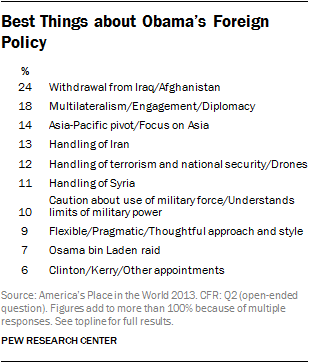
Unlike four years ago, when Council members overwhelmingly named Obama’s emphasis on engagement and diplomacy as the best thing about his handling of foreign policy, no clear theme emerges when members are asked the same question in the current survey.
About a quarter (24%) mention the withdrawal of U.S. troops from Iraq and Afghanistan as the best thing about Obama’s handling of foreign policy, while 18% cite Obama’s focus on engagement and diplomacy and 14% point to Obama’s focus on Asia. The president’s handling of terrorism and national security is named by 12% of CFR members, with another 7% specifically mentioning the raid that killed Osama bin Laden.
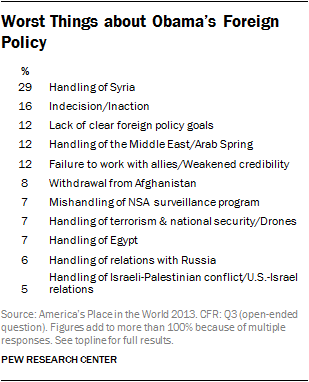
Obama’s handling of Syria stands out as the worst aspect of his foreign policy in the view of CFR members; 29% cite this as the worst thing. Others mention the president’s general indecision and lack of action (16%), lack of clear foreign policy goals (12%), his handling of the Middle East and the Arab Spring (12%) and failure to work with allies (12%).
CFR Members Prioritize Stability over Democracy in Middle East
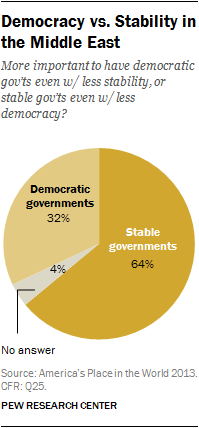
Nearly three years after start of the Arab Spring, most members of the Council on Foreign Relations prioritize stability over democracy in the Middle East. Nearly two-thirds (64%) say stable governments are more important, even if there is less democracy in the region, while 32% say democratic governments are more important, even if there is less stability.
In this regard, the opinions of CFR members are similar to those of the public: 63% of the public views stable governments as more important in the Middle East, while just 28% say democratic governments are more important.
CFR members are reluctant to see the United States become more deeply involved in changes in political leadership in the region. Just 24% say the U.S. should be more involved in changes in political leadership in Middle East countries such as Egypt or Libya. About as many (25%) say it should be less involved, while 50% say it should stay as involved is it is currently.
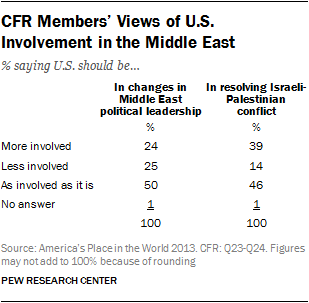
There is more support for the United States becoming more involved in resolving the conflict between Israel and the Palestinians. About four-in-ten CFR members (39%) say the United States should become more involved in resolving the Israeli-Palestinian conflict, while 46% want the U.S. to maintain its current level of involvement; just 14% say it should be less involved.
Most CFR members are optimistic that a two-state solution is possible in the Middle East. Roughly three-in-four (77%) think a way can be found for Israel and an independent Palestinian state to coexist peacefully with each other, compared with just 21% who say this is not possible.
Assessing Prospects for Democracy
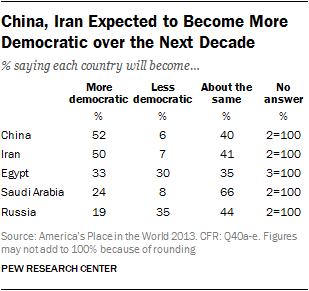
CFR members are pessimistic about the potential for increased democracy in Egypt, Saudi Arabia and Russia. However, they are more upbeat about the long-term prospects for greater democracy in China and Iran.
Roughly half of CFR members say they expect China (52%) and Iran (50%) to become more democratic over the next decade. About four-in-ten expect both countries to be about the same as they are today (40% China, 41% Iran), while relatively few predict that China and Iran will become less democratic.
Far fewer CFR members expect Egypt, Saudi Arabia and Russia to become more democratic over the next decade. A third (33%) say Egypt will become more democratic, 30% say it will become less democratic while 35% think that Egypt will be about the same as it is today.
Two-thirds of CFR members (66%) predict little democratic movement in Saudi Arabia over the next decade; 24% say the kingdom will become more democratic while 8% think it will become less democratic.
Finally, more than two decades after the fall of the Soviet Union, CFR members are quite pessimistic about the prospects for democracy in Russia. Only about one-in-five (19%) think Russia will become more democratic, while nearly twice as many (35%) expect it to become less democratic and 44% expect things to be the same as they are now.
Changing Views of Possible Future U.S. Allies
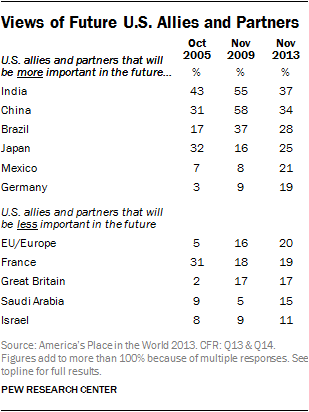
When asked to name which countries will become more important U.S. allies in the future, more CFR members name India (37%) and China (34%). But far fewer see these countries as key future allies than did so four years ago (55% India, 58% China).
Mexico and Germany are increasingly seen as more important U.S. allies in the future. Currently, 21% say Mexico will be a more important U.S. ally in the future and 19% say the same about Germany; in 2009, only 8% named Mexico and 9% named Germany.
European nations – and the EU itself – continue to top the list of countries that CFR members say will be less important future allies. About one-in-five say Europe or the EU will be less important to the U.S., 19% name France and 17% Great Britain. Another 15% say they expect Saudi Arabia to be a less important U.S. ally in years to come; that is up from just 5% in 2009.
Long-Range Policy Goals
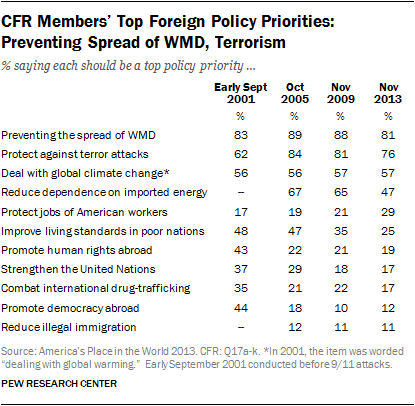
In assessing the country’s long-term policy priorities, CFR members continue to place greater emphasis on security goals than on promoting democracy or human rights, or improving living standards in poor countries.
Consistent with past Pew Research surveys of foreign affairs experts, stopping the spread of weapons of mass destruction tops the list of what CFR members say should be a top priority for the U.S. About eight-in-ten (81%) currently say this should be a top priority; at least as many said the same in surveys conducted between 1993 and 2009.
Taking measures to protect the U.S. from terrorist attacks also remains a top priority; 76% see this as a top goal, as did 81% in 2009 and 84% in 2005. Just before the 2001 attacks, fewer (62%) said protecting the U.S. from terrorism should be a top priority.
A majority of CFR members (57%) also view dealing with global climate change as a top policy priority. The public is far less likely to say that addressing climate change should be a major objective (37% top priority). Conversely, just 29% of CFR members view the protection of jobs as a top goal of American foreign policy. A large majority (81%) of the public thinks that the protection of jobs at home should be a major foreign policy objective.
The goal of improving living standards in developing countries is viewed as a less important long-range policy than in previous America’s Place in the World surveys. Just 25% of CFR members say it should be a top priority; in both 2001 and 2005, nearly half of the foreign policy experts rated this as a top priority (48% in 2001, 47% in 2005).
Just 19% of CFR members see the promotion of human rights as a top policy goal and just 12% say the same about promoting democracy abroad. These opinions are little changed from recent years, but in 2001, shortly before the 9/11 attacks, more than four-in-ten rated each as top policy priorities (43% human rights, 44% democracy).
Iran’s Nuclear Intentions, Possible Lessons from Syria
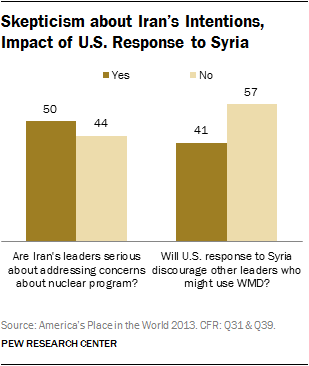
CFR members express mixed views about two current foreign policy issues that have raised concerns over the spread of weapons of mass destruction. Amid multilateral negotiations over persuading Iran to abandon some of its nuclear development goals, 50% of CFR members believe that Iranian leaders are serious about addressing international concerns about Iran’s nuclear enrichment program, but nearly as many (44%) say Iranian leaders are not serious. (The survey was completed before the multilateral agreement aimed at freezing Iran’s nuclear development program.)
Council members are even more skeptical that the U.S. response to the use of chemical weapons in Syria will discourage other leaders who might consider the use of weapons of mass destruction. More than half (57%) do not think other leaders will be dissuaded, although a substantial minority (41%) is optimistic that the U.S. response to events in Syria will discourage other leaders who might consider using such weapons.
Threat of Terrorism and Impact on Civil Liberties
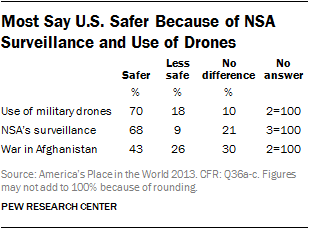
Concerns about possible terrorist attacks in the United States have declined among CFR members in recent years. Currently, two-thirds believe the ability of terrorists to launch another major attack on the U.S. is less than at the time of the 9/11 attacks; 23% say terrorists are as capable of launching a major attack as they were in 2001, and 8% say the risk of an attack is greater now.
Four years ago, a narrower majority (56%) said the ability of terrorists to launch a major attack on the U.S. was less than at the time of the 9/11 attacks. In 2005, however, CFR members were not as convinced; about the same number said terrorists were less able to launch a major attack (44%) as said their ability was the same as in 2001 (43%).
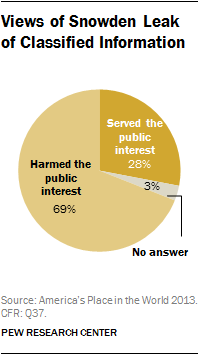
Most CFR members say the use of military drones and the NSA’s surveillance programs have made the United States safer from terrorism. Fully 70% say the use of military drones to target extremists in Pakistan, Yemen and elsewhere has made the U.S. safer; 69% say the NSA’s phone and internet surveillance programs have made the nation safer.
However, opinions are more mixed regarding the impact of the war in Afghanistan on America’s security. Just 43% of CFR members say the war in Afghanistan has made the U.S. safer from terrorism, while 26% say it has made the country less safe and 30% say it has not made a difference.
Perhaps not surprisingly, considering the share who say the NSA’s surveillance programs have made the country safer from terrorism, most CFR members (69%) believe that Edward Snowden’s leak of classified information about these programs have harmed the public interest.
This view is particularly common among those who say the NSA’s programs have made the country safer; 82% in that group think Snowden’s leak of classified information has harmed the public interest, compared with 40% of those who say the programs have made the country less safe or have not made a difference.
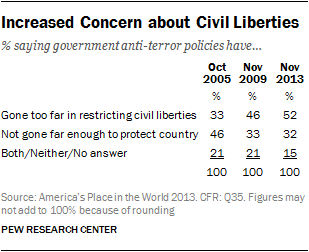
Still, despite the widespread belief that the NSA’s surveillance programs have made the country safer, about half of CFR members (52%) are concerned that the government’s anti-terrorism policies have gone too far in restricting the average person’s civil liberties, up from 46% in 2009 and 33% in 2005.
Those who say the NSA’s surveillance programs have made the country less safe or have not made a difference are nearly twice as likely as those who think these programs have made the country safer to express concern that government anti-terrorism policies have gone too far in restricting civil liberties (79% vs. 40%)
CFR Members Favor Defense Cuts
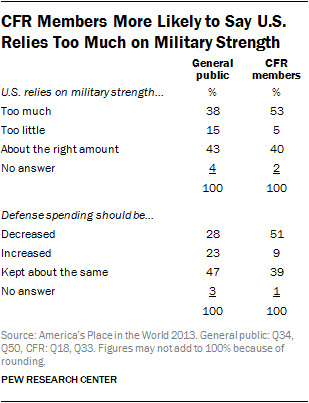
About half of Council members (53%) say the U.S. tends to rely on military strength too much to achieve its foreign policy goals; 5% say the U.S. relies on military strength too little, and 40% say it does so about the right amount.
Notably, CFR members also are more supportive of reductions in defense spending than they were four years ago. Currently, 51% say defense spending should be decreased, compared with 40% in 2009.
The general public has more mixed opinions about whether the United States relies too much on military strength and about levels of U.S. spending. Only about four-in-ten (38%) believe the U.S. relies too much on its military strength. Among the public, there is nearly as much support for increasing defense spending (23%) as for decreasing it (28%); 47% say it should be kept about the same.
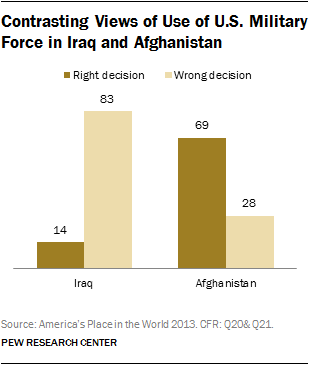
Despite CFR members’ support for defense cuts, 64% say U.S. policies should try to keep it so America is the only military superpower; 29% think it would be acceptable if China or another country became as militarily powerful as the U.S.
When asked about the decisions to take military action in Iraq and Afghanistan, CFR members offer widely divergent opinions. An overwhelming majority (83%) believes the decision to use military force in Iraq was the wrong one; just 14% say the U.S. made the right decision. In contrast, 69% say the U.S. was right to use military force in Afghanistan, while 28% say this was the wrong decision.
By contrast, the public has more similar opinions about the decisions to use military force in Afghanistan and Iraq: 56% have a positive view of the decision to use force in Afghanistan while 49% say the same about the decision to take military action in Iraq.
Trade and Globalization
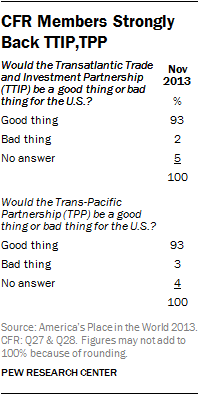
Council on Foreign Relations members are virtually unanimous in saying that the growing trade and business ties between the U.S. and other countries is a good thing for the country; 99% offer this view, including 86% who say increased international trade and business ties are very good for the U.S.
In particular, CFR members endorse two proposed free trade agreements: the Transatlantic Trade and Investment Partnership (TTIP), which the U.S. is negotiating with the European Union, and the Trans-Pacific Partnership (TPP), which the U.S. is negotiating with eleven countries in Asia and Latin America. Fully 93% say the TTIP would be good for the U.S. while an identical percentage has a positive opinion about the TPP.
CFR members, unlike the public, believe that the potential upside from the cross-border movement of companies and people far outweighs the downside. More than nine-in-ten (96%) say it would mostly help the U.S. economy if more foreign companies set up operations in the U.S., and 73% think more U.S. companies moving overseas would be mostly beneficial for the economy.
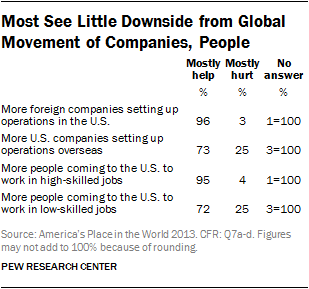
Nearly all CFR members (95%) say that more people from other countries coming to the U.S. to work in high-skilled jobs would mostly help the economy, while 72% say the same about increasing numbers of people coming to the U.S. to work in low-skilled jobs.
While the public generally thinks that more foreign companies coming to the U.S. would mostly help the economy (62%), just 23% have a positive view of the impact of more U.S. companies moving overseas. And fewer than half expect positive economic effects from more people coming to the U.S. to work in high-skilled (46%) and low-skilled (43%) jobs.




